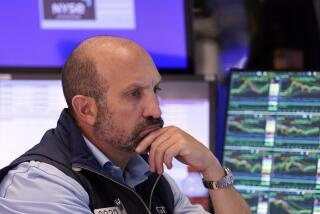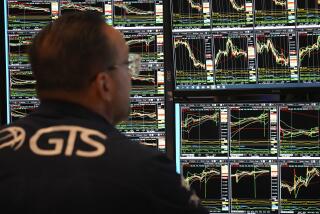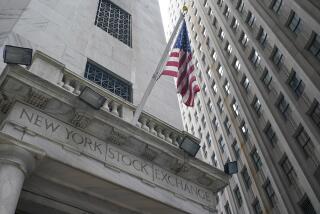Dollar Soars Against Yen, Mark as World Takes New Look
- Share via
The dollar staged a spectacular rally Thursday, surging against the Japanese yen and German mark amid growing optimism that the U.S. currency has seen its worst days.
If real, the turnabout could shift the outlook for world financial markets, perhaps at least temporarily favoring lagging foreign stocks and bonds over their streaking U.S. counterparts, some analysts say.
In a burst of buying Thursday that some traders credited partly to a deficit-reduction vote by the House Budget Committee, the dollar soared in New York to close at 85.65 yen, up 2% from 83.91 on Wednesday, and to 1.432 marks, up 3.2% from 1.388 on Wednesday.
The dollar’s liftoff followed two weeks of mostly sideways movement, after a winter and spring crash that had left the currency down 20% this year against the yen alone.
While analysts say the fundamental problem that has battered the buck remains--the United States is sending a surplus of dollars abroad because of its huge budget and trade deficits--sentiment is building that the decline has been grossly overdone.
“I think we’re in the process of making a bottom in the dollar,” says William Dudley, economist at brokerage Goldman, Sachs & Co.
The key, Dudley and other Wall Streeters say, is that the market may be sensing that the U.S. budget and trade deficits could begin to shrink significantly in the years ahead, thus shrinking the global dollar surplus. “People may be realizing that we do have an undervalued currency,” Dudley says.
On Thursday, the House Budget Committee’s approval of a blueprint for massive federal spending cuts through the year 2002 clearly had an impact on currency markets. While Congress and the White House may be a long way from actually achieving a balanced budget, analysts say investors are increasingly reaching the conclusion that the political will--and public will--is there to get the job done.
At the same time, the nation’s trade deficit could also begin to narrow, courtesy of the slowing U.S. economy (which should depress import demand) and rising pressure on Japan and Europe to stimulate their economies (which should keep demand for U.S. exports high).
Though the Clinton Administration’s threatened trade war with Japan may be a risky strategy, some analysts see the tough U.S. approach as the crowbar that may finally open Japan’s sheltered markets--forcing Japan to spend more and recycle its mountain of dollars.
In Europe, meanwhile, German Bundesbank officials have hinted in recent days that additional interest rate cuts are possible there, to keep the German economy on track. And in France, Jacques Chirac’s presidential victory, on a platform whose chief plank is boosting employment, is another hopeful sign that Europe’s economy may pick up the slack as the U.S. economy downshifts.
If the dollar is indeed ready to retake some ground against the mark and yen, or at least stabilize, what’s the potential effect on world stock and bond markets? Some views:
* U.S. stocks. They’ve been red hot this year, and the weak dollar gets some of the credit. By cheapening U.S. export prices abroad--and boosting repatriated profits of U.S. multinational firms--the anemic dollar helped stoke investors’ growth expectations for American companies.
Does the threat of a stronger dollar now weaken the case for U.S. stocks? David Shulman, investment strategist at Salomon Bros., thinks so. “The benefits of a weak dollar to corporate earnings will soon disappear,” he warns. At the very least, he says, investors will rethink whether the blue-chip multinational stocks that have led the 1995 rally are worth their current record-high prices.
But the flip side is that a stronger or stable dollar could bring foreigners back into the U.S. stock market. Their net purchases have been a mere $15.1 billion over the last five years, Federal Reserve Board figures show.
Japanese investors, however shell-shocked by the dollar’s long plunge, may not be able to ignore U.S. stocks if the dollar strengthens, says Steven Nagourney, strategist at Lehman Bros. in New York. U.S. assets now look cheap in yen terms, Nagourney notes, while returns in Japan’s own stock and bond markets “are punishingly low.”
* U.S. bonds. The bond market could face a split decision if the dollar has bottomed. Foreign purchases of U.S. Treasury securities have soared in recent years, but that has largely been a function of foreign central banks’ buying in defense of the dollar. If those central banks now begin unloading what they’ve bought--mostly shorter-term bonds--shorter-term U.S. interest rates could face upward pressure. There were rumors of central bank selling on Thursday.
Longer-term bonds, however, could win with a stronger dollar by attracting new foreign buyers, especially if slower U.S. economic growth keeps inflation subdued.
* Foreign stocks. Foreign stock markets have mostly lagged the surging U.S. market this year, and most of those markets also fell more than the U.S. market last year. A stable or stronger dollar could give foreign stocks the excuse they need to catch up, says Nagourney, if foreign investors stop fearing that U.S. exporters’ currency advantage will grow further.
The mind-set may already have begun to change: On Thursday, Singapore, Hong Kong and other smaller Asian markets rose sharply.
But American investors in foreign stocks (or foreign stock funds) have to pray that the dollar doesn’t appreciate too much, because a stronger dollar automatically devalues overseas assets, the reverse of the weak dollar’s effect.
(BEGIN TEXT OF INFOBOX / INFOGRAPHIC)
Buying American
Foreign investment in U.S. Treasury bonds soared last year, helped by central bank purchases. But U.S. stocks saw little net foreign buying. Net foreign investment, in billions of dollars:
U.S. Treasuries
U.S. stocks
Source: Securities Industry Assn.
More to Read
Inside the business of entertainment
The Wide Shot brings you news, analysis and insights on everything from streaming wars to production — and what it all means for the future.
You may occasionally receive promotional content from the Los Angeles Times.










